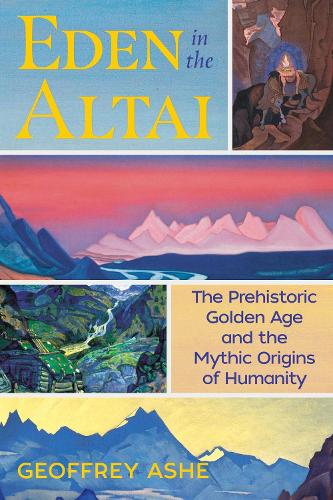
Eden in the Altai: The Prehistoric Golden Age and the Mythic Origins of Humanity
(Paperback, 3rd Edition, Revised Edition of Dawn Behind the Dawn)
Publishing Details
Eden in the Altai: The Prehistoric Golden Age and the Mythic Origins of Humanity
By (Author) Geoffrey Ashe
Inner Traditions Bear and Company
Bear & Company
11th December 2018
3rd Edition, Revised Edition of Dawn Behind the Dawn
United States
Classifications
General
Non Fiction
201.3
Physical Properties
Paperback
368
Width 152mm, Height 229mm, Spine 23mm
596g
Description
Reveals how humanitys first advanced culture originated in the Altai-Baikal region of southern Siberia
Explores how this prehistoric culture is the source of the pervasive mythic symbolism of the number 7, found in ancient cosmologies and myths around the world
Traces the Altaic influence on the Rishis of India, the creation of the Vedas, and the origin of the sacred legend of Mount Meru
Explains how the Hellenic cults of both Apollo and Artemis originated in southern Siberia as well as the pervasive bear symbolism found throughout the ancient world
Myths of a Golden Age, a paradise at the beginning of human existence, are nearly universal in all cultures. But where was this Eden located Refuting the traditional assumption that the cultures of the Middle East and Mycenae filtered northward into Europe and North Asia, noted historian Geoffrey Ashe instead identifies the northern Altai mountain range and Lake Baikal region of southern Siberia as the true cultural home of humanity and the source of the widespread myths of a prehistoric Golden Age.
With evidence dating back as far as 24,000 BC, Ashe shows how the culture of prehistoric southern Siberia was matrifocal, Goddess-worshiping, and heavily shamanic and served as the progenitor of advanced ancient culture in the Western world, the missing link that later influenced Indian, Middle Eastern, Native American, and European society, culture, and religion. He reveals how ancient Altaic culture was the source of the pervasive mythic symbolism of the number 7, found in cosmologies and mythological traditions around the world, as well as reverence for the seven stars of Ursa Major, the Big Dipper, and the idea of a sacred mountain to the North. He traces the transmission of these cosmological beliefs into Babylon and ancient Greece by migrating tribes, including those that crossed the now-vanished land bridge to the New World.
Ashe reveals how this transmission of beliefs had a profound influence on the seven-note musical scale, the seven astrological planets, and the seven vowels of the Greek alphabet, as well as the development of seven as a sacred number in Judaism. He shows how the ancient Altai-Baikal culture influenced the Rishis of India, the creation of the Vedas, and the sacred legend of Mount Meru. He also reveals how the Hellenic cults of both Apollo and Artemis originated in southern Siberia as well as the sacred bear symbolism found throughout the ancient world.
Offering proof that advanced cultures existed in Europe before the immigration of Eastern peoples, Ashe shows that early societies did not look into the future for perfection but to the past, to the Golden Age of peace in the sacred northern mountains.
Reviews
Recent archaeological discoveries in the Altai Mountains of Siberia have revealed the existence of a unique human population known today as the Denisovans. They reached their height around 60,000-70,000 years ago and possessed advanced technologies that may well have contributed to the rise of civilization. Geoffrey Ashe, in his own fascinating quest of discovery, provides compelling evidence that the Altai Mountains are indeed the cradle of human civilization as well as the true Eden of the East. * Andrew Collins, author of The Cygnus Key and Gbekli Tepe *
In Eden in the Altai, Geoffrey Ashe brings a broad base of perspectives to bear on his thesis that the archaic Goddess tradition, closely linked to shamanism, took its origins in the Altai Mountain region of Asia. He does a very good job of contrasting competing historical, geographical, and religious viewpoints as he makes his case. * Laird Scranton, author of Decoding Maori Cosmology and The Mystery of Skara Brae *
Author Bio
Geoffrey Ashe (19232022) wrote several books, including King Arthurs Avalon and The Discovery of King Arthur. Widely regarded as one of the leading Arthurian specialists in the world, Ashe became a Fellow of the Royal Society of Literature in 1963 and was appointed a Member of the Order of the British Empire (MBE) in 2012.
